#a Jedi's compassion
Text
Whump: The Musical Day 2: Wicked ("No Good Deed Goes Unpunished.")
Fandom: Star Wars (bad batch time zone but not the batch)
Warning: referenced and an attempted suicide of a side character
Summary: Caleb stops a man from killing himself. When some citizens see this they report him to the authorities.
Why did Caleb have to save that man?
Roofs were a good place to travel when you didn't want to be found. The ex-padawan learned that pretty fast. Being above everyone had its advantages. Seeing everything that was going on below you made being someone everyone wanted dead at but safer.
But then he came across a man who was ready to jump. Before Caleb could stop himself he started to talk. "Sir?" he asked. "Are you okay?"
The man looked panicked as he turned around. "Get going kid. You don't want to see this." Before he could say anything, the twi'lek jumped.
Running to the side of the six story building, instinct kicked in and Caleb reached for him. Before the man hit the ground, he found himself levitating. There was a look of surprise on his face, as well as the faces of the people nearby.
The danger the child had put himself in, hadn't made it's way to his fears yet.
Caleb ran down the stairs. Skipping steps made him reach the bottom quicker. Bursting though the metal doors, the boy ran to find the man who was still sitting on the sidewalk. "Sir?" He started. "Are you okay?"
Crying, the man tried to smile. "Thank you kid. I'm okay."
"So, what's been going on?" Caleb said as he sat next to the older man.
"You're a child."
"Then let's find someone for you to talk to." He stood again and extended a hand to the man. The Twi'lek nodded and took his hand.
"Do you have any family or friends?" As he spoke, Caleb started to feel the eyes on him. He realized what had happened. Shoving the thought off to the side, he starts to lead the man away from the crowded street.
"No."
"Same" was the first thing that came to Caleb's mind but he figured he probably shouldn't say that.
"How about I take you to the nearby hospital? They can help you there."
Despite the look of defeat in his face, the man agreed.
They took the scenic route. Caleb knew he needed to avoid larger streets. With the empire around and with them knowing he was around, hiding was important.
As they closed in on the hospital, a voice came from behind them. "There! Get the Jedi!"
Turning around, Caleb looked at them. Then he turned to the man, "I have to go. Please, take care."
Then it was time to run. The padawan did a lot of that. It hurt, having to run away from the man. Every part of him wanted to finish taking him to the hospital.
The imperial presence on the planet was a large one. Hiding, Caleb ducked into a building. Then he started to run for the roof. They seemed to be his only safe place. He always liked sitting in the highest place he could find at the temple.
The kid made his way to the stairs. Tripping over some stairs on the third floor, slowed him down. His ankle was sore.
On the stairs of the sixth floor, imperials caught up to him. The door was in sight. Pushing the men down the stairs, Caleb threw open the door to the roof. Without looking back, he jumped to the next building.
After a while of jumping from building to building, Caleb took a break. Out of breath, he started to curse himself out. Why did he have to save that man? Jedi instincts were going to get him killed.
"No good dead goes unpunished I guess" he whispered. It seemed he almost lived by this saying. Every time he helped someone, something bad happened to him. Maybe he should learn to control his companion. Maybe he should have just let the man have his way out.
Listening to his surroundings, he deemed it was safe to wait a few more minutes. Sitting down, Caleb looked at his ankle. Luckily, he had just twisted it.
It was time to move. There was a nagging feeling in the kids heart that told him he needed to make sure the man had gotten to the hospital alright. It wasn't too far, even if he had been running in the opposite direction.
The stairs down the building he had ended up on, creaked as he walked down them. Opening the door, Caleb faced the night. The beautiful sunset that had previously painted the sky, was gone. It was a pretty sight to kill yourself too. The red and orange in the sky would have matched the red on the pavement as well as the orange of the man's skin.
Caleb snuck around, trying to find a discreet way to the hospital. "Why am I doing this?" He muttered. "This is gonna get me killed."
After a while of walking and a few close calls with the empire, Caleb found the hospital. Seeing the nurse reach for the phone sent a cold chill down the kid's spine. "Excuse me?" He said, his voice going up a few octaves. "Did a Twi'lek come in earlier to be admitted to the psychiatric ward?"
"Are you family?" The nurse asked, setting her phone down. She hasn't been calling about him.
"No, I'm the person who stopped him and brought him most of the way here. I just-" he sighed, trying to keep from crying. "I just wanted to make sure he got here okay."
The nurse came around from her station. "He came in. He's been admitted." She put her hand on his shoulder. "You're a good kid."
"Thank you. I'm just doing my job." That probably sounded strange to the poor nurse.
"Can I call your parents, I'm sure they'll be proud of you for saving that man's life."
What did he tell her? She was right, Depa would be proud. "My Mom's out of town. I'll just head home."
"Okay. Stay safe."
"Can I do me a favor?" He asked quietly.
"I'm sure I can." The girl kneeled beside him.
"Can you tell him I got away safely? That I came to check on him, and if the empire asks, can you say I was never here? I'm just trying to survive and every time I do something to help people, it always gets me caught and I'm just so tired." Tears welled in Caleb's eyes and the nurse tightened her grip on his shoulder.
"Of course I can." She pulled him into a hug and Caleb started to cry. It had been so long. The boy wasn't sure how long he had been there, but by the time he stopped crying, his throat was sore and his eyes hurt.
The nurse let go of him and walked around the counter. Grabbing soothing she walked back over to him. "Use this to get you something to eat. This is a safe place for you."
"Thank you. For everything. Hopefully this doesn't hurt you. My Captain, Styles-"
"You fought in a war?"
Instead of answering, Caleb continued his sentence. "He used to say that no good deed goes unpunished. Just be careful." Before she could ask any more questions, Caleb made his way to the door.
The nurse caught up to him, "hey kid." She kneeled down beside to make sure no one else would hear what she had to say. "May the force be with you."
There was something comforting about hearing that. "Thank you." With that he left the hospital and shortly after that, the planet.
#Whump: The Musical#no good deed goes unpunished#whump#star wars#star wars whump#Whump: The Musical day 2#caleb dume post 66#caleb dume#padawan kanan#kanan jarrus#a Jedi's compassion
9 notes
·
View notes
Text
Saw a post a few days ago that said the Sith could lead the Jedi to the dark side by using lust alone.
That's just bullshit.
Ma'am the Jedi ain't catholic priests and they sure are not celibate, they are in far more polycules than a person can physically keep track of, to them nudity is just another aspect of a someone's being that's neither a taboo nor something shameful to be hidden away, and physical touch is just a way to show love (of any type) to others.
Yes they fuck nasty, they would have an impassible face while looking at the Sith undressing themselves, and then would look at those dark side titties and say "Saw and had far better last Thursday, can I go home now?"
And those who don't fuck by choice you say? They'd look the Sith in the eyes and say "You really think you're that special uh?"
I don't care what you allos say, Jedi would not be led to the dark side with a fuck, come on.
Yes this is a hill I'm ready to die on.
#and I'm saying all this as an aro/ace individual btw#already complained about this on the discord server#and decided to share my thoughts with you all as well#if a fuck can change you're entire moral compass buddy I have bad news about your mental stability#you allos are so fuckin strange when coming up with things like this#I always refuse to believe that there are people who actually think and feel these things#unfortunately I do know some people that are like this so my hopes are in vain....#really random thoughts#star wars#jedi love#jedi order#jedi#sith
741 notes
·
View notes
Note
“poncho: jedi master edition” is such a good and necessary cal kestis form, seeing him attempt to teach a gaggle of padawans is simply the best thing i could imagine. i hope they also roast him sometimes in true middle schooler fashion <3
ok so i drew this AGES ago (way before the other post) and I think this counts as an excuse to post it! they probably do accidentally roast him a little but one of the ways they forget compassion in lieu of middle schooler "dont care about adults" is:
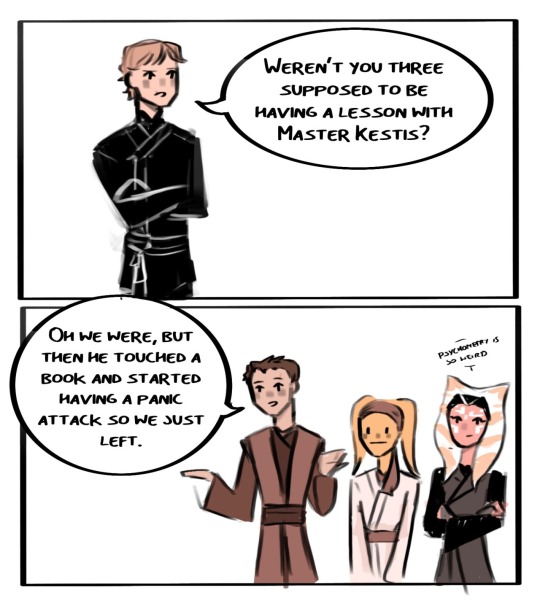
#i just thought 'ok luke recovering old jedi texts is great but cal's gonna touch one and just relive o66'#or some other random jedi temple stuff that'll basically trigger his ptsd lol#cue luke grabbing merrin and running in like HEY CAL YOU GOOD???? SORRY MY STUDENTS HAVENT CLOCKED THE COMPASSION THING YET#kofi subscribers have had this for like. a month LOL#luke skywalker#luke's jedi academy#merricaldemy#star wars#luke's students#aaren#alela#sayuri ireshla#my doods#thanks for the ask!
1K notes
·
View notes
Text
I love how much Obi-Wan loves Anakin and Padme’s kids.
We see it all throughout his series.
He spends what little money he has to buy Luke a toy space ship. He dutifully watches over him everyday as he lives in a desolate, isolated desert scape.
He goes after Leia… fearful that he doesn’t have what it takes to save her any longer. He risks himself and everything else to find her. He taps into the force again after breaking himself off from it. He trusts her. He looks at her fondly. She reminds him of Padme.
Then, at the end, after Vader buries him alive, for a moment, he acts as if he has lost the will to live. He’s defeated. He thinks of the past. He feels that he failed Anakin. Flashbacks of their final moments on Mustafar plague him. Right as he’s about to give up completely, he thinks about the children. He sees flashes of Luke and Leia in his mind, and he draws upon the force. He is strengthened by his love and compassion for them. Even though he’d lost his family, lost Anakin, he still has an obligation to the kids. They provide hope to both he and the rest of the galaxy.
I don’t know. I just get all sentimental when I watch it. I just love Obi-Wan so much.
#star wars#obi wan kenobi#obi wan series#darth vader#padme amidala#leia organa#luke skywalker#jedi compassion knows no bounds#obi wan loves padme and anakin’s kids
92 notes
·
View notes
Text
The Jedi as pigeons, revered and loved until they outlived their usefulness. In the same way pigeons find it hard to survive after being domesticated and then discarded, so do the Jedi. The many things that made them so adored and useful now make survival harder
71 notes
·
View notes
Text
It drives me crazy when people claim that Luke's compassion comes from Padme. I love her, but she didn't raise him. She had less of an affect on his morals than Anakin did. Luke's compassion doesn't come from his uncle Owen either. It comes from his aunt Beru. The woman who took in a child at great personal risk and helped turn him into one of the galaxy's kindest. Beru made Luke compassionate: She made him care. Padme may have given birth to Luke, but Beru raised him. She was an incredible mother figure and shouldn't be discounted because she isn't blood related to him.
#beru lars#owen lars#luke skywalker#star wars prequels#star wars fandom#jedi#star wars#compassion#adoption#family#star wars meta
377 notes
·
View notes
Note
I read your disagreement on this popular sentiment that "The Jedi Were Flawed" and I couldn't agree more with your disagreement. The Jedi are not the problem in the galaxy. It's everybody else: the Sith for plotting a revenge conspiracy for 1,000 years, the Republic for being plagued with corruption in which the Sith had a hand in (but not all Republic senators were corrupt), the Mandalorians for being warmongering a-holes, the Hutts and other crime syndicates who terrorize innocent people, the Separatists for making problems worse by starting a war with the Republic, the Empire for bringing tyranny upon the galaxy, and if you're an EU fan, the Yuuzhan Vong for starting an unprovoked war against the galaxy that causes the deaths of TRILLIONS of people!
That post came about almost as a reaction to pro Jedi people constantly talking about how OF COURSE the Jedi were flawed all the time and how annoying I find it more than anything else lol. It's very annoying to have to keep seeing posts by people who I know do LIKE the Jedi talking about how flawed they are, how they make mistakes, blah blah blah.
I've had people ask me why the sentiment of "the Jedi were flawed" can't co-exist with the sentiment of "the Jedi were RIGHT" or "the Jedi did nothing wrong" and, to me, it's not that they can't coexist in a more general sense, but they don't coexist NARRATIVELY to me. "The Jedi were flawed" is just a bullshit statement because the entire point of the narrative is that the Jedi were RIGHT. So what does it add to that particular theme and storyline to insist that the Jedi were flawed all the time, or that they made mistakes? How does it add to the message about being selfless and compassionate to insist that the characters who are in the story specifically to showcase why it's important to be selfless and compassionate are in fact also flawed and make mistakes?
It ALSO bothers me because the people who most often say it are the ones who mean "the Jedi were flawed" as "the Jedi deserved what they got" or "the Jedi were wrong the whole time" or "the Jedi should've changed their entire culture to accommodate one person" or "it was the Jedi's fault that everything bad in the galaxy happened." So when fans who LIKE the Jedi and don't actually believe any of that continue to insist "OF COURSE I believe the Jedi are flawed" it just smacks of desperation, of trying to appease these other fans who will never change their minds. Why bother trying to insist on a middle ground when what they mean by "the Jedi are flawed" is not the same as what a real Jedi fan means by it? What does it add to try to find a middle ground with someone whose interpretation is so completely the opposite of your own? Why bother?
So yeah. I never say the Jedi were flawed because I don't find it a particularly useful way to analyze the story or the Jedi's position within it. The Jedi were right, the Jedi are always right, and it's not honestly any more complicated than that.
#star wars#jedi#pro jedi#this doesn't mean the INDIVIDUAL CHARACTERS can't be more complicated necessarily#like is obi-wan a well-rounded character with flaws? yes#is yoda a well-rounded character with flaws? yes#is mace a character who occasionally makes mistakes? sure#but none of this means that the JEDI AS A WHOLE - the jedi as a group within the narrative - are flawed#the JEDI are always right#the individual characters are sometimes flawed#oh wow just realized that is literally the opposite of when some people love indiv jedi but keep saying the order is flawed lol#nah mates if you loved them you'd see it's the opposite way around#the individual PEOPLE are flawed but the order never is#the order is a symbol of compassion and selflessness and light#obi-wan is occasionally an arrogant little bitch tho
119 notes
·
View notes
Text
me when someone says luke is a bad teacher and made grogu "choose" btw being a jedi and his dad:
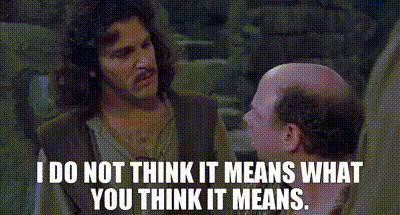
what he did was ensure grogu could one day be a jedi AND have his dad now!!!
#bruh....#he said grogu's HEART wasnt in it#then created a child-appropriate scenario where grogu would be free to choose his dad with no ill will#realizing of course the love between grogu and din and feeling compassion as he loved and misses his own father so dearly#and he has a new Order where he will allow those attachments#only to hope one day (perhaps even after his own death) grogh would return to complete his trainjng#KNOWING he would never be able to do so if he isnt ALLOWED TO LOVE HIS DAD NOW WHILE HE HAS HIM#which was the OPPOSITE OF THE OLD ORDER AND THE OPPOSITE OF WHAT THE JEDI DID TO ANAKIN AND SHMI#luke skywalker is WISE and compassionate#he totally understood grogu#he said you may never see the mandalorian again- your training may take you elsewhere your bond may be frayed#and its true#maybe din would die on his own without grogu's help#which would have happened several times already in s1-2#LUKE GETS IT#anyway#dinluke#luke skywalker#i mean im not defending favloni bc they have no idea what theyre doing#but i dont think this was ooc as per luke's outlook on his new jedi ordee#order#din grogu#what he did was ENSURE GROGU COULD HAVE THE JEDI AND HIS DAD!!!
338 notes
·
View notes
Text
At this point I'm kinda just tempted to say the word attachment should be confiscated from star wars. Yes the principle is thematically relevant but there are other ways to express that theme and anyway, the specific word is used a grand total of one time in the movies, right? If I'm remembering right? As a word it's not even a real tagline or essential or anything, fandom just fixated on it, but you can just drop it and find a less micro-aggression-y way to misunderstand star wars
#this isn't a promise to never mention it again#in fact another point is already brewing in my head#the only time that word is used is side by side with possessing people and in opposition to compassion I sure wonder what that means#jedi#attachment discourse
48 notes
·
View notes
Text
We Are: No conflict just vibes 😘
The Rebound: ALL THE CONFLICT 👊
#we are the series#the rebound#thai bl giving me whiplash today#jesus p'golf what are you setting up here#the plot is plotting#i immediately love jedi#he's like I'll sit with the only person having a moral compass in this school thx
39 notes
·
View notes
Text
Pro-Jedi Essay On the Life and Fate of Shmi Skywalker (long post)
Many who believe that the Jedi Order had lost their way, are pointing at the life and death of Shmi Skywalker. However, their arguments are based on unexamined assumptions regarding the role and ways how the Jedi Order operates, the political and legal reality of the Galactic Republic, or founded on morals different from those depicted and advocated by George Lucas.
This is a long essay, possibly the longest I ever wrote, since each and any discussion regarding Shmi Skywalker and the Jedi Order, is the interplay of five distinct topics, con-joined and informing each other. These are:
The Paradigms of Love: Hierarchical vs. Horizontal
The Fall of the Galactic Republic: Fallen Symbiosis
Horizontal love, Anakin Skywalker and the Jedi Way
The Dark Side of "they could've free at least Shmi!
The Life and Fate of Shmi Skywalker - the Problem with "Deserving"
The Paradigms of Love: Hierarchical vs. Horizontal
One of the core lessons throughout George Lucas Star Wars, is that we need to clear ourselves from the attitude of discrimination toward others, based on feelings of distance and closeness, and that love manifests in two ways, along the same lines. On the one hand, there is love for those who’re immediately around you – your spouse, your parents, your children, your friends, and you do everything you can to protect the people that you love, against all those others outside that very tightly drawn circle. It’s driven by attachment: whether a person is within or without that circle, is determined by whether or not you find them enjoyable, agreeable, pleasant and satisfying, or whether or not they share your beliefs and opinions. We have the idea, deeply embedded into our minds, that the willingness to put people within that circle, our “personal relationships” first, and all the others who we have a bad, or no relationship whatsoever, second, is the measure of love, loyalty, commitment, affection and care.

On the other hand, there is unconditional love, that is compassion: wanting another person to be happy and free from suffering. By definition, compassion means to feel with, to suffer with and to experience with another - it's the sense of profound oneness, innate connectedness, a sense of being parts of each other, when we feel another person's suffering or happiness as our own. Just like when we hurt our finger, we don't think, "Oh, my finger is hurt, maybe I should help it", but rather, there is an instant and intuitive, natural response to it, our quest to be happy and not to suffer is inseparable from and complemented by the same quest of our loved ones. Unlike attachment, compassion can extend beyond the individuals who we're close with or make us feel good; based on the realization that all living things want to be happy and doesn't want to suffer, just as intensely as we and our loved ones are, it can encompass all living beings wanting to be happy and free from suffering - in fact, not even one living thing can be excluded from the circle of compassion. And therefore, if compassion is genuine, it's no longer possible to make hierarchy between the well-being of the people who're close to us and of those with whom we have adverse or no relationship at all.
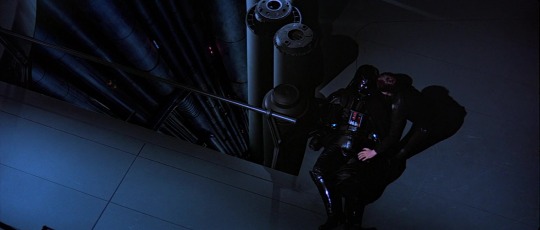
It's essential to understand that genuine compassion is to abandon such hierarchical thinking, not the reversal of the hierarchy, that is to discriminate toward the people we have close, compassionate, loving and trusting and personal relationships for the sake of the people we have adverse or no relationship at all. Nor does genuine compassion allow for lowering the love, care and commitment we have for those close to us, or to forego such relationships, that is trying to avoid discriminating based on feelings of distance and closeness, by not getting close to anyone. In many ways, that's more unwholesome. Genuine compassion is horizontal: the realization that all living things want to be happy and doesn't want to suffer, just as intensely as we and our loved ones are, allows compassion, the wish for others to be happy and not to suffer, to spread effortlessly, evenly, inexhaustibly. Indifference is to say, "I care no more for my mother than I care for a stranger", compassion is to say, "I care for this stranger no less than I care for my mother." In Buddhism, indifference is the "near enemy" of non-attachment: it's mimicking it, but it pushes us into suffering.
The Fall of the Galactic Republic: Fallen Symbiosis
The Balance of the Force
George Lucas' Star Wars story is essentially about the loss and restoration of the balance of the Force. Although there are many interpretations on this concept, Lucas himself was very clear on that balance of the Force means keeping our selfishness under the check of our selflessness and avoid falling to the dark side, which is greed and self-centeredness, and being compassionate instead, which is loving each other unconditionally and caring for each other. It's dual: when you find balance, you're a compassionate individual, you control your selfish side, and you can do a lot of good things; and when you have a group made up of compassionate individuals who control their greed, you can have a symbiotic circle, which is the balance of the two sides of the Force at large, of the galaxy itself, that is selfishness being under the control of selflessness, and people come together to be as one, cooperating.
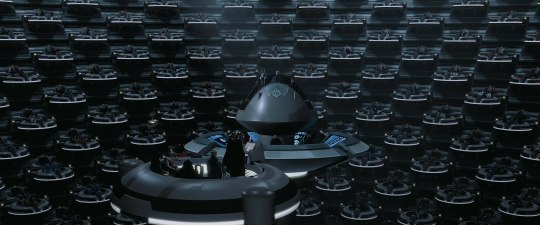
The central conflict of George Lucas’ Star Wars story is the loss of balance and the fall of a symbiotic relationship. The Galactic Republic is the galaxy forming a symbiosis, following the horizontal paradigm, existing in balance; the loss of balance is the shift from the horizontal love paradigm to the hierarchical one. "The Republic is not what it once was. The senate is full of greedy, squabbling delegates. There is no interest in the common good" and it "no longer functions" as it was said it Episode I, and as Lucas tells us, it's because "the Senators have fallen out of the symbiotic circle” and “they couldn’t agree on anything because their interests became so divergent, so they couldn’t get anything done as a Republic.” It's crucial to understand that although it's very popular to declare that the problem was the Senate, therefore, the Jedi Order was supposed to stop serving it, the issue depicted in Lucas' Star Wars is far worse and roots deeper than that. As corrupt and dysfunctional the Senate become, it was made up of senators who were elected directly or indirectly by the people of the member worlds. And as Ahsoka teaches the youth of Mandalore in Clone Wars, "citizens must be vigilant so corruption can't take root" and "it's every citizen's duty to challenge their leaders, to keep them honest and hold them accountable if they're not. Lasting change can only come from within." The horizontal love paradigm was declining in the entire galaxy, with individuals no longer operating as a group, no longer running their democracies, slowly drifting towards the hierarchical paradigm, which eventually erupted in the Separatist movement and the Clone Wars, resulting in the galaxy's fall to the dark side: the Galactic Empire. As Lucas summarizes the fate of the Republic: "well, the people gave it away." One of the core reasons why the "Jedi lost their way" theory gained a foothold is because the people are very much troubled by this notion, since it reveals that they have all the responsibility for maintaining democracies.
Understanding the Hutts and Hutt Space

The existence of slavery at the Outer Rim is the result of the gradual decline of the Galactic Republic. Tatooine is an out of the way, small, poor, sparsely populated planet on the outer rim of the galaxy, the home of the Jawas, the Sand People, scavengers and moisture farmers, controlled by the Hutt families who are vile galactic gangsters. It's part of the galactic underworld, where the anti-slavery laws of Republic, that are, as Padmé says, outlawing slavery in the entire galaxy, are not respected. As Shmi states, "The Republic doesn't exist out here. We must survive on our own." On Tatooine, the Republic's currency has no value, as people want "something more real", like ships, pods or slaves or "wupiupi" which is most likely made of something that has value on its own. Being the den of a powerful crime lord, the planet's spaceports, where slavery thrives, are "havens for those that don't wish to be found" and a "wretched hive of scum and villainy" - it's no surprise that in the cities grown around them, holding others hostage for economic gains or pleasure, which is against the laws established by the Galactic Republic as well, is part of everyday life. Hutt-controlled Tatooine is not a "slave state" as opposed to the "free states" of the Galactic Republic, like in the pre-1865 USA, nor it's an entity that shares borders with the Republic. In truth, Hutt Space, and everything within its borders can be paralleled only to those areas of Sudan, Liberia, Sierra Leone, Uganda, Congo, Niger and Mauritania, where the government has no effective control, and slavery is still alive and well in 2023. Although Jabba and the others are usually addressed respectfully, they're universally regarded as "criminals" or "vile gangsters." When Palpatine says, they must reach an agreement with Jabba, Mace Windu replies: "I don't like this, dealing with that criminal scum. This is a dark day for the Republic."
The Jedi Order: Guardians of the Waining Light
The Jedi Order was well aware of that the Force is out of balance. As Lucas says, "[Dooku] carries the sympathies of most of the Jedi, which is that the senate is corrupt and it's incapable of carrying on any meaningful action, because they argue about everything all the time" however, restoring lost balance cannot be done through force, only through bringing compassion and sanity back to the Senate and the galaxy. Many who believe, the Jedi Order had lost its way, argue, the Jedi Knights failed as guardians of peace and justice, neglected their duties and turned their backs on the most vulnerable - however, such allegations are founded on the idea that they were supposed to be the ones in the universe who erase injustice, conflict, and wrongdoing. It's very important to remember that the Jedi Knights, as they state it repeatedly throughout the Saga, are "keepers of peace, not soldiers" and "not warriors." Even though the Jedi Knights were inarguably very good warriors, in Episode II, it was illustrated powerfully that they cannot win on the battlefield. "A lot of people say, 'What good is a lightsaber against a tank?' The Jedi weren’t meant to fight wars. That’s the big issue in the prequels" Lucas reminds us. "If they do have to use violence, they will, but they are diplomats at the highest level" and "they don't kill people. They don't fight," and they "weren't mean to fight wars." If they Jedi would've decide to wage a war on the Hutts, the war would've siphon off Jedi Knights, neglecting the rest of the galaxy and they’d have lost, most of them killed, making things even worse.
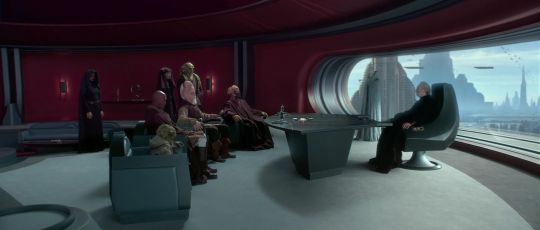
The essential difference between a Jedi Knight and a superhero is that superheroes are fundamentally god-like individuals who fight our battles for us: they topple dictators, stop corrupt politicians and greedy companies, they fend off armies, stop us from destroying ourselves. A Jedi Knight cannot and won't do that. As George Lucas says, "[the Jedi Knights] were never designed to be a superhero or anything like that. They were designed to be a Buddhist monk, who happened to be a very good warrior." Whenever they're do involved in battles, they do so in order to protect key figures who're able to unite their people against the forces of greed and destruction, like Padmé Amidala, both Queen and Senator, and Duchess Satine. They worked closely with the Chancellor of the Republic, especially with Palpatine, who promised to fight off corruption in the Senate and lead the galaxy toward a better future. They are “monk-warriors” who are “monks first, and they try to convince people to get along.” They’re “ultimate father figures” and “intergalactic therapists” and “warrior-monks who keep peace in the universe without resorting to violence.” They are heavily reliant on compassionate, democratic, thus strong galactic community, the ever-growing symbiotic circle, to guard peace and justice: the Jedi Order needed the Republic, and later, the Rebellion, to succeed. And they had reassurance that the lost balance will be restored: it was prophesied that the Chosen One will come and bring balance to the Force.
Horizontal Love, Anakin Skywalker and the Jedi Way
Widely popularized ideas are that the reason why Anakin is not going back to Tatooine to free Shmi, is because he was forbidden by the Jedi Council to do so; he expected something fundamentally different regarding the Jedi teachings, or their way of life, their limitations or the way how they operate - however, these ideas are not just lacking any rational basis in the actual story, but also wildly contradictory to Anakin's portrayal. In truth, all these assumptions are stemming from fans conflating their own expectations and perceptions regarding the Jedi Order with how Anakin and other characters are actually viewing them, and/or the desire to see the hierarchical love paradigm being affirmed by Star Wars.
"I had a dream I was a Jedi. I came back here and freed all the slaves"
In Episode I, Anakin Skywalker is a very compassionate, very selfless and very good kid, who gives without a thought of reward and know nothing of greed, who dreams of becoming a Jedi Knight, and he is very clearly thinking along the lines of the horizontal model of love. He tells Qui-Gon, "I had a dream I was a Jedi. I came back here and freed all the slaves. Have you come to free us?" which clearly shows that he considers himself as part of a team, encompassing all the slaves in Tatooine, and in his mind, a Jedi Knight is not only freeing his mother and friends, the people he's close with, but everyone. When he is about to leave with Qui-Gon to actually become a Jedi Knight, he vows, “I will come back and free you, mom” and we know that he plans to achieve this by making his dream come true.
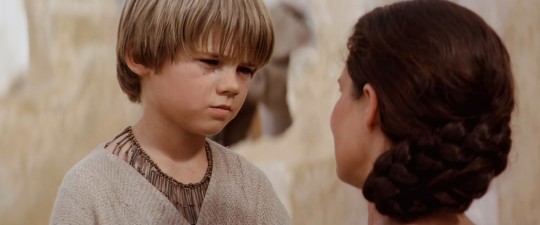
Anakin's situation is the same as Padmé's in Episode I: while Naboo is invaded and its people are tortured, Padmé does not establish a hierarchy between the well-being of her loved ones and the well-being of the rest of the Naboo, but decides to go with Qui-Gon to Coruscant to ask the help of the Senate, which was supposed to be the quickest, easiest and most effective way of freeing her planet. Anakin leaves with Qui-Gon for the Jedi Temple at the heart of the Republic, to become a Jedi Knight, to become the hero who will return and bring freedom to his mother and all of the slaves.
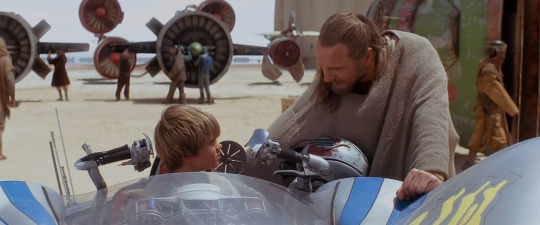
It's to be noted that even though a portion of the Star Wars fandom criticizes the Jedi Knights for not ending slavery on Tatooine or not trying to free at least Shmi, accusing them with indifference or failure to do their duty to guard peace of justice, Anakin Skywalker himself doesn't hold these opinions. He knows that a Jedi Knight brings peace and justice, and his expectations that as one of them, he will free his mother and all the slaves, is realistic: the anti-slavery laws of the Republic are outlawing slavery in the entire galaxy, and in the past, with a functioning Republic, the Jedi Order dismantled the slave empire of Zygerria, enforcing the laws, guarding peace and justice. It's very important to notice, that even though he believes, "no one can kill a Jedi", it never once occurs to him to cast stones on Qui-Gon or the Jedi Order for the conditions on Tatooine - he's offering his help so they can leave the planet and continue their journey to Coruscant as soon as possible. Never once suggests that they should go to battle against the slavers, or use violence against them, not even when he realizes that Shmi must stay on Tatooine. All this clearly shows, he understands and adheres to the Jedi way. Even more so, the only thing that Anakin is shown to be wrong about the Jedi Knights was his belief, "no one can kill a Jedi" - never once he gives any reason for us to believe that he expected something fundamentally different regarding the Jedi teachings, or their way of life, their limitations or the way how they operate. It should be noted that it's not the Jedi Order, but the Republic, what he becomes more and more frustrated with: in Episode II, he admits, "I don't think the system works," believing, if the people can't agree on what's the best for the most people, "Well, then they should be made to."
Anakin's Decision and the Circumstances on Tatooine
Part of the problem is that slavery is a very emotionally charged issue to discuss and for some, this may result in a quite misguided assumption: the fact, Anakin and Shmi were enslaved, means, the mistreatment of the slaves of ancient times, the torture and brutal dehumanization of enslaved black people in the southern U.S. as well as the suffering of victims of modern day slavery, are all integral part of their lives on Tatooine. Oftentimes, it's founded on the belief that their enslavement indicates, signifies, represents slavery in general, thus, it must be viewed, imagined, discussed through the historical, cultural, political and social parameters in which the Atlantic slave trade, how it relates to the U.S. and the West as a whole, is central. However, such approach is highly problematic: the type of slavery they were subjected to, lacked, and therefore wasn't the offshoot of the dehumanizing brutality of racism. In George Lucas' Star Wars story, slaveholders were shown to recognize differences between species, but they collapsed those differences to the consideration: “the weak deserve nothing more than to kneel before the strong, bound to our service.” This type of slavery obviously can, and often will result in brutal, inhuman treatment, but it's crucially important to acknowledge that just like Ancient Greek, Roman and Egyptian slavery was very different from the type of slavery in the southern U.S., slavery in Star Wars also has different political, cultural and social aspects and it must be examined and discussed accordingly.
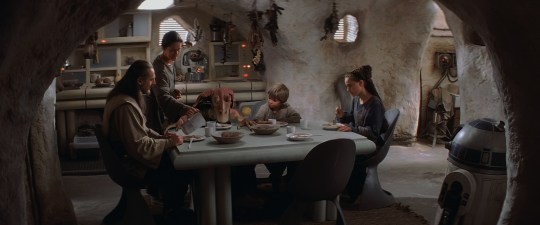
In Episode I, the Skywalkers were shown to lead a life similar to a serf - they lived independently from their slaver, owned personal property and money, were able to negotiate transactions, had considerable freedom in their daily lives. Anakin was shown to feel safe to talk back to Watto, to declare, he won't let himself being defined by his status as a slave, to speak his mind and to confront Sebulba, or to discuss his plan to locate his transmitter and escape, with strangers, and it was shown that a slave is expensive enough that the prospect of having to pay for it, stopped someone as aggressive and hateful as Sebulba from harming Anakin. Although Watto didn't seem to be bothered by promising Anakin to Qui-Gon, which could indicate that it was accepted to split families, it's worth to consider that Watto believed his win to be a fact, thus Anakin will remain his slave, and that he knew that Qui-Gon is from somewhere where the Republic enforces its laws, which explains, why he's not surprised at all when Qui-Gon says, since he won the bet, Watto must release Anakin, rather than transferring ownership.
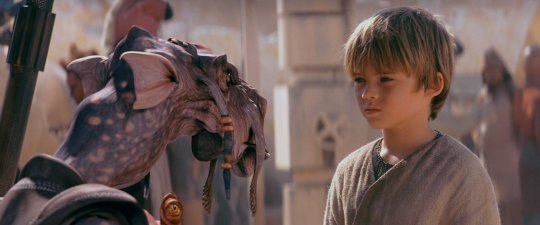
It would be important to note that when he left Tatooine, the cause of Anakin's distress was that he will be on his own and without his mum, missing her, and he become afraid of losing his mother; one must realize that's different from and not the same as being afraid for her life and being worried for her wellbeing. In Episode II, he states, he doesn't understand, why he would have nightmares about her, and when he realizes that he's having premonitions, and returns to Tatooine, his behavior toward Watto is quite friendly, rather than jumping to the conclusion that it must be his former slaver, who harmed Shmi. In fact, George Lucas indicated, Anakin and Watto's reunion in Episode II is analogous to visiting old high school teachers as young adults. What this tells us is that the slaves of those who could very easily afford new ones - such as Zygerrian nobility and Jabba the Hutt - lived a particularly brutal existence, however, most of the enslaved were able to lead a hard, but relatively normal and relatively safe life. Thus, even though Shmi wasn't left in the best circumstances, those circumstances allowed Anakin to leave with the certainty that he will be able to save her.
The Dark Side of "they could've free at least Shmi!"
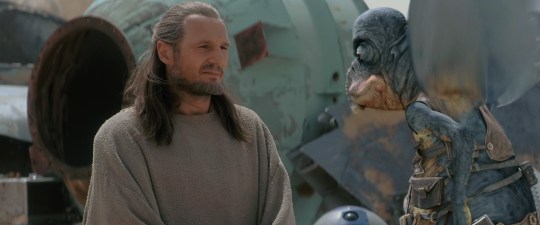
Those people who attach special importance and urgency to Shmi's freedom and insist, Qui-Gon and the Jedi Order was obligated to at least free her, are do so because they like her and they believe she deserves it, or for some, it's Anakin whom they like and therefore they don't want him to be sad without his mum. It's generally unsaid and not even conscious, this type of reasoning postulates that you can and actually, you should arrange people's right to be free into a hierarchy, with those who meet with your standards of goodness who you're close to, or who would make someone you like happy, are enjoying priority over those who you think aren't nice or have no relationship with. Helping those slaves, as this logic goes, is less urgent, they can and they should endure slavery for a bit longer, until the most or more deserving ones are freed. It shouldn't be hard to see, how this way of thinking is actually the flip-side of the way of thinking that condones the institution of slavery, nothing more, nothing less. We have a strong tendency to prioritize the wellbeing of the people who are close to us, who make us feel good, to consider the suffering of people who made us feel bad as well-deserved, to be less concerned, indifferent toward those who we have no relationship at all. But, this tendency is a flaw and it would be important to notice, this is not what Anakin and Shmi would want.
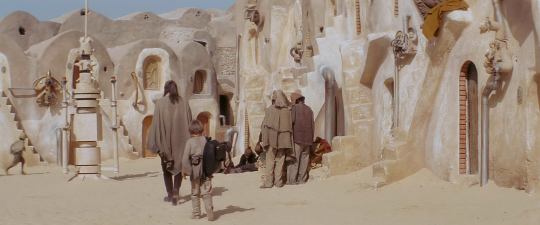
George Lucas’ Star Wars story doesn’t tell us that a non-violent method is the only possible response to injustice and wrongdoing, however, it’s important to point out that this doesn’t mean that it’s ever right to intentionally harm another - but in order to achieve greater benefit for a greater number of people, or when there is no other way to save the defenseless against the aggressor, or it’s an either you or them situation, you can certainly use a violent method. If we examine the situation, killing Watto doesn’t meet with these requirements - it has to do more with the desire to inflict harm upon him or the urge to hit out of those who’re outside of the circle of our personal relationships. Threatening Watto with a lightsaber wouldn’t be as harsh as killing him, but there is no way of preventing him from crying for help - unless killing him - and that would lead to even more killing, not to mention that chances to leave the spaceport would shrink greatly. Therefore, these aren't wholesome responses, and it should be clear why Shmi and Anakin, although he believes, "no one can kill a Jedi," never once suggests that Qui-Gon should go to battle against the slavers, or use violence against them, not even when he realizes that Shmi must stay on Tatooine as Watto's slave, he does not cast stones on him or the Jedi Order for not going to Tatooine to save her. He clearly adheres to these principles in Episode II when he sneaks into the Tusken camp, rather than massacring his way to his mother, but when she dies, out of anger and hate, he wipes them out to avenge her, and in the Clone Wars, he slowly, but steadily becomes more and more willing to kill his opponents, even when he has other options.
A note on Qui-Gon Jinn
Sometimes, Qui-Gon Jinn is accused with being indifferent and ungrateful for not freeing Shmi Skywalker, but, once all unexamined assumptions about the Jedi Order are cleared away, once the dark side of the "they could've save at least Shmi!" is acknowledged, we must realize, Qui-Gon takes Anakin to the Jedi Temple, because he realized, he discovered the promised Chosen One - making him a Jedi Knight, a guardian of peace and justice, giving him the proper training and upbringing to fulfill his destiny, would restore balance to the Force: selfishness under the control of selflessness, people are together as one, cooperating, the Republic functioning enforcing its laws and principles, ending slavery, as it did in the past.

When Shmi asks him, whether he is able to help Anakin to escape slavery, Qui-Gon replies, "I don't know. I didn't actually come here to free slaves." It become popular to assert, this somehow must mean that Qui-Gon is not interested in or he is not intending to free slaves, however, simply no compelling rational basis exists for this assertion. Qui-Gon Jinn is not on Tatooine to free slaves, he was forced to land on the planet ruled by a crime lord, in the middle of a mission to escort a queen who must save millions, to the capital, and he is in desperate need of help. The reason slavery exists in the galaxy is because the Republic no longer functions and fails to enforce its anti-slavery laws. Misinterpreting and misrepresenting these facts is grounded on ingrained mistaken assumptions. In addition, there are those in whom the words, "I didn't actually come here to free slaves" are triggering an emotion that, overthrowing reason, demands them to react with "if he is not on Tatooine to free slaves, he doesn't want to tear down the system!" Which, of course, lacks any sane basis.
The Life and Fate of Shmi Skywalker - the Problem with "Deserving"
It was Shmi Skywalker who taught her son, "the biggest problem in this universe is nobody helps each other." She, just like Anakin, gave without the thought of reward and was full of compassion: despite she was a slave on a world made of dust, Shmi had unwavering commitment to, and raised her son in the spirit of the horizontal love paradigm, was willing to offer refuge to strangers in her home and sharing her meal with them, and was willing to let her son go, so he can become a guardian of peace and justice in the entire galaxy.

Shmi Skywalker, just like her son, had no misconceptions about the Jedi Order and the galaxy: she didn't accuse Qui-Gon or the Jedi in general with failing their duties or being indifferent toward them, and even though she was well aware that the failing Republic abandoned her, she took no pleasure in the misery in the misfortune of Padmé and the others, but was willing to help and letting Anakin to help them. After Anakin left Tatooine to begin his Jedi training, Shmi was freed from salvery by Cliegg Lars, a moisture farmer who later married her. One day, when she was out in the morning gathering mushrooms, she was abducted by Tusken raiders, and she was subjected to brutal torture. Anakin returned to Tatooine to save her, but when they reunited, Shmi succumbed to her wounds and died in his arms. She didn’t ask her son to avenge her, she wasn’t bitter, hateful, angry, fearful. She was happy: “Now I’m complete” and she had nothing to say but, “I love you.” In Clone Wars, Anakin, referring to him wiping out the Tusken village out of revenge, claims "I failed as a Jedi, and I failed you" - implying that Shmi, taught him the same morals and ethics as the Jedi Order.
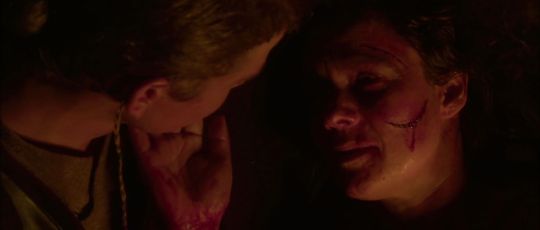
We tend to believe that the world is under the direction of a cosmic moral judge, rewarding good people and punishing bad people - for this, the fate of Shmi Skywalker is often deemed undeserved. From such notions, follows the idea that Qui-Gon Jinn or the Jedi Order was supposed to make sure that justice will be served for her, and what happened to her must be the result of that those, who were supposed to be agents of that cosmic judge, were failed to do their duties. However, the harsh truth is that, the probability of Shmi being abducted by Tusken raiders on Tatooine was the same as the probability of being murdered on any other planet, say, Coruscant. George Lucas' Star Wars presents a cosmos that is devoid of a cosmic system of reward and punishment, and attempts to blame her death on the Jedi Order is quite desperate. The life and death of Shmi Skywalker illustrates the lesson, life will do its own thing, it's not working as a mechanism by which the universe will bring good to good people, bad to bad people. We're interconnected, our lives are interwoven into each other, what happens to us is the product of the actions of others as well as our own, and determined by the degree of balance between selfishness and selflessness without ourselves as well as within others. The greed of Nute Gunray led to the invasion of Naboo and the death of Qui-Gon Jinn, but also led Qui-Gon to Tatooine, where he found Anakin. Shmi let her son go, and her action resulted in the liberation of Naboo, but a decade later, also the formation of the Empire, the destruction of Alderaan, and eventually the death of the Sith and the restoration of balance. Shmi being freed by Lars led to her death in a Tusken camp, Lars marrying Shmi led to his son dying by the hands of imperial storm troopers. All of existence is a vast nexus of causes and conditions, constantly changing, in which everything is interconnected to everything else. Shmi Skywalker illustrates, happiness is not in a reward-punishment system that distributes good and bad among living things based on whether or not they were good or bad. Tapping into her compassion, she was able to accept the reality of the ebb and flow of pleasure and pain of being alive, and was able to find an inexhaustible source of contentment, peace and joy, strength, determination and hope.
Sources:
Star Wars Archives 1999-2005
Star Wars: The Phantom Menace “Prime of the Jedi” featurette
George Lucas’ foreword for Shatterpoint by Matthew Stower
Interviews with George Lucas 1 2 3 4 5
George Lucas' audio commentary for his Saga
Star Wars Saga and Star Wars: The Clone Wars
Please note: I used no Disney or Legends Star Wars materials, (save for the one Shatterpoint foreword) - but I accept that others may found their own reading on them, thus, might come to different conclusions than I do.
#shmi skywalker#anakin and shmi#star wars#very long post#pro jedi order#jedi morals#compassion#attachment#qui gon jinn#slavery#tw slavery
291 notes
·
View notes
Text


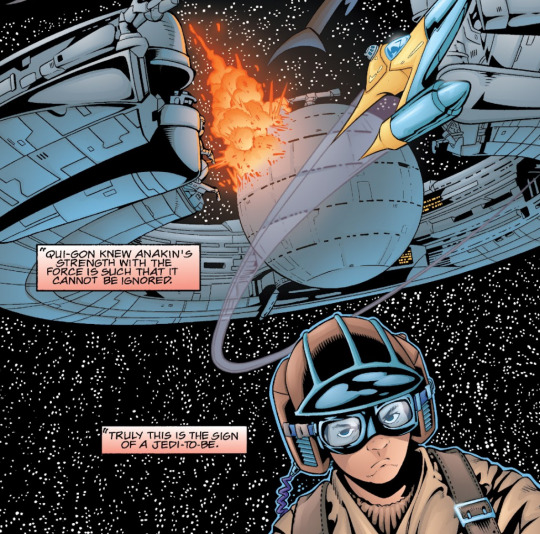
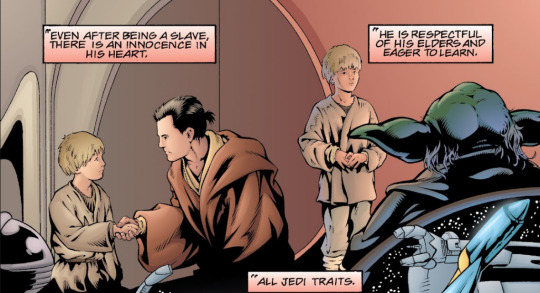
[Star Wars: Episode I - Obi Wan Kenobi]
#star wars#obi wan kenobi#anakin skywalker#anakin at age of ~10 showed compassion bravery eagerness to learn and respect to elders but#all the jedi traits#and then he was trained in Yoda's Jedi Order and he ended as a sith lord#not saying anything but...#on serious note i like that comics make a point about bravery of leaving mother#to travel far away and meet unknown jedi masters#and then jedi are uh uh you miss your mom so bad#heh
131 notes
·
View notes
Text
my clone culture headcanon is that they have almost no traditional mandalorian ties, they picked up almost nothing culturally/linguistically from the mandalorian trainers, but the one thing they DID get were endearments/affectionate and-or comforting words/etc.
b/c 1) that was the only way the trainers could somewhat express affection for their favorites without getting dinged for being too attached to them since no one there actually spoke mando’a 2) kaminoans would be Unhappy if the clones expressed affection openly so secret language words were the only way to safely verbalize caring and loving, so they picked up on those few kind words VERY quickly
(The way I see it working is that the trainers had favorites, would occasionally say something like “chin up, hang in there, good job kiddo,” and said favorites picked up those terms without actually ever getting Direct Translations of what they mean. So they get the words and some context but have to jumble it together themselves and pronunciation and meaning change the further away it spreads from the original favorites - because all of this is spread in private, quietly, until it grows its own legs in different iterations with different battalions imho
like they know adding -‘ika to a name is affectionate and feels like a diminutive but they don’t know what it means exactly and sometimes plug it into names in grammatically odd ways, so instead of “Trap’ika” you get “Trapper’ika” which sounds more like “Trapperka” when you’re talking fast.)
(i’m just a fan of gentle soft pet names and showing affection quietly and how love finds a way and how the clones can take what little scraps they were given and make it their own)
#starlight fandom#star wars#clone troopers#clone trooper culture#mandalorian culture#the clones didn’t get much of anything they had to take and mold what little they did receive#the few kind words they received would be hoarded and built upon I feel that strongly#and I’m v much a ‘I don’t see them getting much of mandalorian culture even if the trainers had tried to teach them’#which I don’t think they would#but even if they did I think the clones would have enough ‘the galaxy doesn’t care about us we are our own people’ that they#would create so much of their own beliefs and culture based on their circumstances rather than what little they were fed by others#all of the posts about clones picking up Jedi beliefs make me feral tbh because the thought of them choosing Jedi compassion -#after being bred for war is very chef’s kiss to me#(I also hope this doesn’t come across anti-mandalorian that’s not what I’m aiming for at all)#(I just don’t think the clones are mandalorian and I don’t think most of them would want to be)#(I also don’t think the clones would ever be a ‘one size fits all’ in these beliefs like there’s probs at least a dozen of them who do want#mandalorian culture and a handful that would want to be more traditional and a handful that would want to melt beskar down for scrap)#(I just find it unlikely that there would be one overarching clone culture after they left kamino I think there would be a base/foundation#but they’d develop in different directions and different dialects and different beliefs almost immediately due to 1) war 2) separation#3) sped up aging that means their development is fast tracked - a month in war is like aging 10yrs for them I bet)#anyway I’ll shut up now this is my personal headcanon supported not at all by canon I just like playing in the sandbox :)
21 notes
·
View notes
Text
friendly reminder that this exists
“i don't think luke is presenting an argument either way. because i think luke also, of any jedi in the galaxy, understands what it would be like to be with the person you care about most -- to be with your father figure”
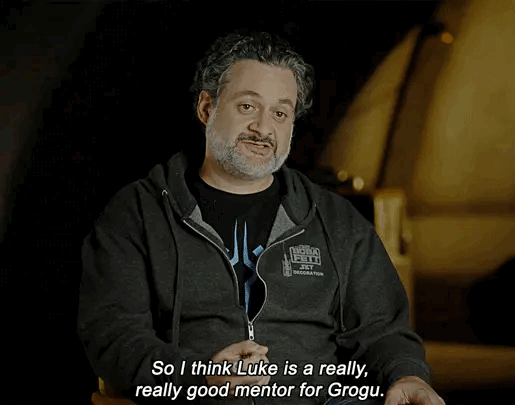
#dinluke#filoni gets it - he gets that luke wanted to present grogu w a choice#a modern jedi who wouldnt make the decision for him like his predecessors would#luke knows what its like to lose his uncle and aunt his master and his father#hed never want grogu to lose his dad#or make that choice for him#luke is such a good egg#i just have the big sad thinking that luke was only a cameo bc although he was a good mentor he wasnt destined to be grogus master#thats the vibe i get#so it gets me thinking they wont bring him back#but god i hope im wrong#like he was the perfect jedi for grogu to learn that lesson from and the perfect person to show him kindness and understanding and compassio#compassion#at that point in grogus young life#and thats all it will be#but heres hoping im wrong 🙃#i do feel like s3 will be all abt mandalore tho and luke wont be in it#maybe s4 grogu will come back around to accepting both his jedi abd mandalorian halves#but not before that#but anyway.. just slowly breaking it to myself not to expect luke so im not heartbroken lmao#tagging dinluke because cmon theyre his dads#star wars
251 notes
·
View notes
Text
I don't know if anyone in the Star Wars fandom has been keeping up with the High Republic comics, but in the most recent issue there was a whole mission to save a Force-sensitive child from the experiments of the nefarious Baron Boolan of the Nihil.
The "away team" on this mission was the Jedi Sskeer, Tey Sirrek and everyone's favorite badass Twi'lek, Lorna Dee.

(Look at that badass entrance!)
The reason the only Jedi that's going on this mission is Sskeer is because of the Nameless, the beasts that eat the Force and kill Jedi. Since Sskeer's connection to the Force is so diminished, it makes him perfect for this.
All of this aside, things go pear-shaped, as they do in Star Wars, and Lorna Dee and the child they're their to rescue almost get got by one of Boolan's monsters, only for Keeve Trennis to show up at the last minute to save the day... and their lives.

This is a very remarkable feat because the Jedi are rendered virtually defenseless around the Nameless because of the latter's Force-eating abilities. But the fact that Keeve managed to overcome that because she heard the cries of Lorna and the Yacombe girl, is amazing.
The Jedi's compassion is what allows them to overcome those things that were thought to be insurmountable. I love that!
#i just love the jedi so much#i love heroes who's superpower is compassion#keeve trennis#lorna dee#sskeer#tey sirrek#star wars: the high republic#in defense of the jedi
19 notes
·
View notes
Text
The Sith´ari and the Chosen One
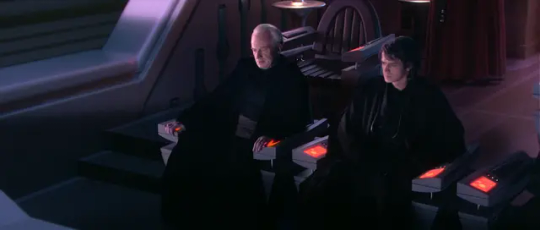
"It really has to do with learning. Children teach you compassion. They teach you to love unconditionally. Anakin can’t be redeemed for all the pain and suffering he’s caused. He doesn’t right the wrongs, but he stops the horror.
The end of the Saga is simply Anakin saying, ‘I care about this person, regardless of what it means to me. I will throw away everything that I have, everything that I have grown to love - primarily the Emperor - and throw away my life, to save this person.
And I’m doing this because he has faith in me, loves me despite all the horrible things I’ve done. I broke his mother’s heart, but he still cares about me, and I can’t let that die.’
Anakin is very different in the end. The thing of it: The prophecy was right. Anakin was the Chosen One, and he does bring balance to the Force. He takes the ounce of good still left in him and destroys the Emperor out of compassion for his son."
George Lucas, The Making Of Revenge Of The Sith; page 221
So I have been thinking on Palpatine and Anakin´s relationship in terms of prophecy and what each of them are to their respective orders and I believe this is one of the reasons why their bond is so interesting to me.
Given how Palpatine destiny in the story was to make a reality 1000 years of Sith Grand Plans and rebuilt the Sith Empire, I believe he truly was meant to be the Sith'ari, a sort of King figure in the old sith Empire, there was a prophecy about him, about how he was going to bring back the sith order to their former glory so his connection to Anakin as a person and as the chosen one was predestined imo. Their fate was to destroy each other from the very beggining and in a way both prophecies completement each other and both became true in the end.
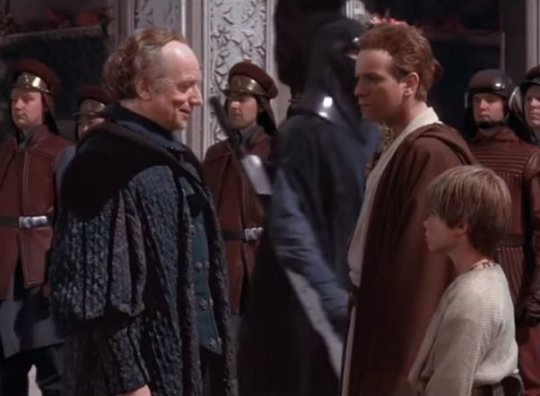
Palpatine is the only one aware of this reality, his master was afraid of Anakin and wanted to kill him before he could ruin their plans but Palpatine, in his pride and sense of ownership over Anakin, thought that it was possible to harness Anakin´s future, just like the Sith always sought to harness the force power in the benefit of the sith and this is how their story begins with Anakin being an innocent child who grew to respect and actually love Palpatine as a friend and father figure before he discovered the truth and Palpatine being the serpent in Anakin´s life ready to pounce and destroy Anakin emotionally and psychologically so he could take him for the sith under the wise of his well intentioned and nice mentor.

What I guess neither Palpatine or Anakin expected was for Palpatine to develop actual feelings of ownership that could be taken as a kind of slight care, that keep him from letting die young Vader on Mustafar, something he would not have done for Dooku or Maul and not only this but to do everything in his power, using his own force strenght to keep Anakin alive. This after years of knowing him as a child, seeing him grow and become a strong warrior but also years of listening to each other and just being there for each other, which was done by desing on Palpatine´s part, he wanted Anakin to become emotionally dependent only on him, what he didn´t expect was Anakin to also have an effect in his decisions.

This small moment of mercy from the Sith Master towards someone he saw as his slave but who he saw grow up and involved himself in his life in a way he didn´t do for any of his apprentices, lead him to keep alive Vader, who served him faithfully and blindly for 20 years, this was the reason why years after Vader would be in the precise place and moment to destroy Palpatine to save his Son, not out of hate and thrist for power as the sith do but out of love, because even while Vader is stopping Palpatine, his intention was to protect Luke from both of them and even when he did this he didn´t stop loving Palpatine but he wasn´t going to let him kill his Son, in fact in the ROTJ novel Vader considered if he had to go down the reactor shaft as well and with this action, Anakin saved the galaxy from 10,000 years of Sith Empire, making a reality the old chosen one prophecy.

imgur.com
Palpatine was controlling the imperial soldiers under his command in the Death Star and of course he was using the force to turn the stakes in his favor during Luke and Vader´s duel, just like he did years before in the prequel trilogy to keep the Jedi Order blind of his presence, it isn´t a coincidence the rebel alliance was able to fire at the death star just moments after Palpatine died. This is how Lucas symbolized the relationship between the force and the actual events happening in the war on the physical plane, if the darkside is strong, the sith have the advantage, if the light side is stronger, the sith are defeated. Vader killing Palpatine to protect his Son definitely counted as a light side win which lead towards the return of the Jedi and in Anakin´s case, the return of the Jedi/Person he used to be.
Palpatine: "Vader! I am your master!" Darth Vader: "Darth Vader's master! But not Anakin Skywalker's!" ―Darth Vader, to Emperor Palpatine before casting him down the Death Star II's reactor core shaft
And all this would not have happened without that small moment of mercy from Palpatine and that small stubborn light who refused to die inside of Vader´s heart which Luke called and brought back to life.
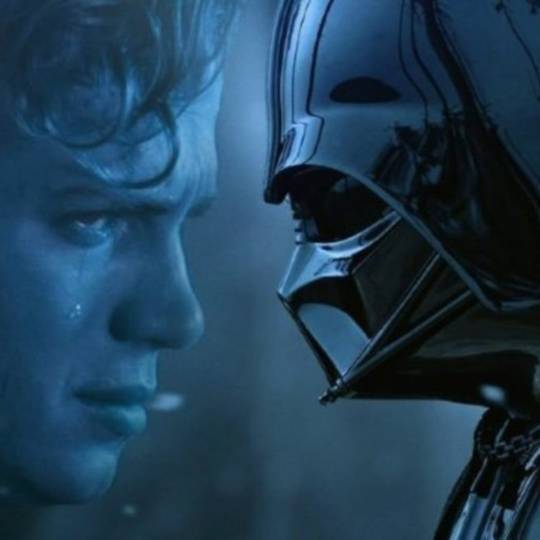
#anakin skywalker#Emperor palpatine#star wars#return of the jedi#Sith´ari & the chosen one#long post#anakin meta#Palpatine & Anakin#Luke made Vader remember compassion is unlimited love#The Emperor learned mercy from Anakin#Fathers and Sons#Anakin &Luke#Palpatine and Anakin#star wars meta#sw meta#padme amidala#luke skywalker#George Lucas#prequel trilogy#original trilogy
30 notes
·
View notes